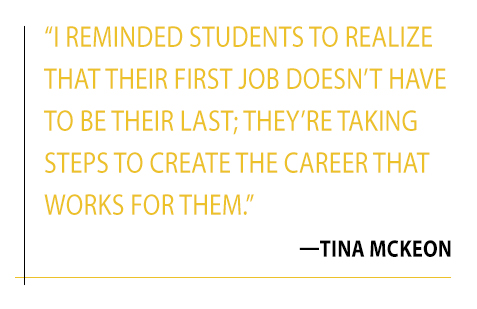Tina McKeon, Ph.D., J.D., began her career as a physical therapist; then she became a neuroscientist. But she found her scientific calling far beyond the laboratory and clinic. Today the UAB alumna is a patent attorney in Atlanta who advises universities, research institutions, and corporations on intellectual property matters in the life sciences and biotechnology fields.
What led McKeon away from the lab? “It was a severe allergy to laboratory animals,” she says. “An allergist told me I was not physiologically suited for my job. That allowed me to look at other options. Back then, you got your Ph.D., went into academia, and did research. I didn’t know many people who hadn’t done it that way.”
Through a friend, she met a patent attorney who inspired her to consider law as an alternative. “Patent attorneys generally don’t decide at a young age that’s what they’ll grow up to be,” McKeon says. “It’s an obscure path, and all patent attorneys were either an engineer or a scientist originally. Every patent attorney has a story like mine.”

The Right Questions
When McKeon was a physical therapist, “I wanted to understand more, particularly about the nervous system,” she says. “My husband was working in Birmingham, so I found myself in graduate school at UAB. It was a good fit.”
McKeon originally had planned to go back to physical therapy after earning a master’s degree, but “I kept going and got my Ph.D.,” she says. “I was in the anatomy department, but I did most of my research in the Department of Psychology. I took some courses with medical students and some with graduate students. It was a collaborative, enriching atmosphere.”
After graduating from UAB with her Ph.D. in anatomy (neuroscience) in 1986, McKeon completed postdoctoral work in physiology and neurobiology in Vermont and Ohio. Later, when she had decided to become a patent attorney, she completed law school in Atlanta while raising three children. Following a clerkship with a judge on the U.S. Court of Appeals for the 11th Circuit, McKeon worked for several Atlanta law firms before joining Kilpatrick Townsend, one of the city’s larger firms.
Today McKeon relies on the scientific knowledge she gained at UAB to help clients protect and manage their discoveries. “A number are involved in innovations related to treating Parkinson’s disease or traumatic brain injury,” she says. “But I don’t focus only on neuroscience—I work on a wide variety of inventions.” Her educational background offers a good foundation for every case, she says. “Graduate school is where I learned to ask the right questions.”
McKeon also has maintained a relationship with UAB. “I’ve been working with UAB for many years on a number of matters; one relates to a therapeutic antibody for cancer, and it’s a fascinating case to follow,” she says. “My work with UAB also has given me a chance to meet some wonderful scientists.”

An Asset for Any Career
McKeon recently participated in a UAB seminar to introduce a wide range of career options to graduate students facing a decreasing number of positions in academic science nationwide. “Students worry about whether they have wasted their time getting a degree because they may not be able to do what they had planned,” she says. “I encouraged them to think about how to tell their story and explained that their education is an asset. It provides tools for any career with a scientific bent. I also reminded students to be open-minded and realize that their first job doesn’t have to be their last; they’re taking steps to create the career that works for them.”
As for her own career, “I hope to stay where I am until I retire, which won’t be anytime soon,” McKeon says. “I enjoy what I do. You’ve got to meet your client’s needs, and do it on their timeframe. I like the challenge.”


